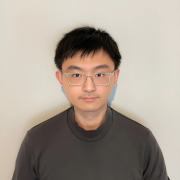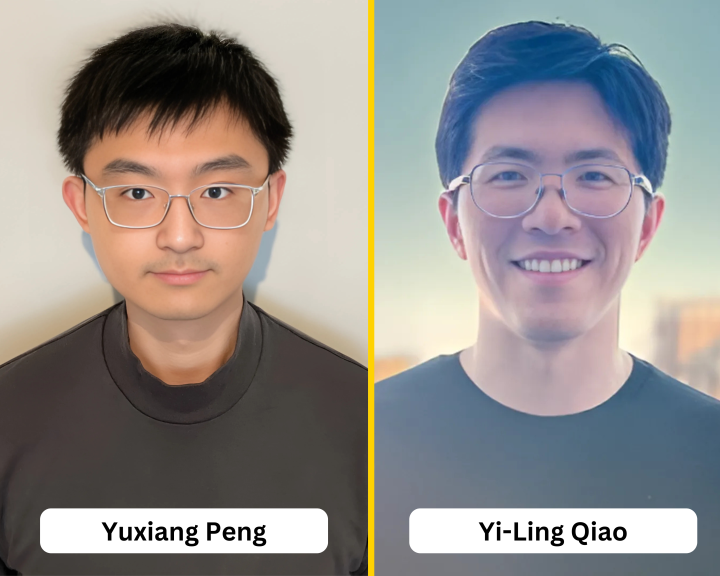Two Ph.D. Students Receive Larry S. Davis Doctoral Dissertation Award
The University of Maryland’s Department of Computer Science has announced the recipients of the 2024-25 Larry S. Davis Doctoral Dissertation Award. Yuxiang Peng (Ph.D. '24, computer science), who will join Purdue University in fall 2025, and Yi-ling Qiao, a fifth-year computer science Ph.D. student in UMD’s GAMMA Group, received the award, which recognizes dissertations for their technical depth, significance, potential impact and presentation quality.
Named after Professor Emeritus Larry S. Davis, the award honors students who showcase innovative work in computer science. Davis, who served as department chair from 1999 to 2012, made significant contributions to computer vision and high-performance computing, earning him recognition as an IEEE Fellow in 1997.
Yuxiang Peng:
 Peng’s research, advised by Associate Professor Xiaodi Wu, focuses on developing programming languages tailored for quantum computers.
Peng’s research, advised by Associate Professor Xiaodi Wu, focuses on developing programming languages tailored for quantum computers.
"I developed languages and built high-assurance compilers to control quantum systems,” Peng said. “This enables them to perform computational tasks with certifications such as mechanized proofs and formal theories for quantum compiler rules."
The recognition of Peng’s work represents an important milestone in his career. He emphasized the award's significance in bringing attention to his contributions to quantum computing.
"I am honored to receive the dissertation award and excited that my work will gain broader attention," Peng said. "My research will help accelerate advancements in quantum computing. I would like to sincerely thank my advisor, Xiaodi Wu, and my colleagues at QuICS for their contributions to the work of my dissertation."
By addressing critical challenges in the field, Peng aims to create tools that enhance the computational capabilities of quantum systems, potentially leading to practical applications in the near future.
"In my dissertation, I developed fundamental tools for programming analog quantum systems and digital quantum computers," he said. "These tools hold great potential for maximally utilizing the computational power of current and future quantum systems. With further progress along this research path, I believe quantum computers could begin delivering practical advantages in real-world problems within the next decade."
Yi-ling Qiao:
 Qiao’s research focuses on integrating data-driven and model-based approaches in AI. His dissertation, advised by Professor Ming Lin, explores the development of simulations designed to enhance AI’s understanding and reasoning within digital environments.
Qiao’s research focuses on integrating data-driven and model-based approaches in AI. His dissertation, advised by Professor Ming Lin, explores the development of simulations designed to enhance AI’s understanding and reasoning within digital environments.
"I aim to leverage the merits of both data-driven and model-based approaches by designing novel physics-informed learning algorithms," Qiao said. "In recent years, I have undertaken many pioneering works in differentiable simulation toward this goal. I plan to develop more realistic and accessible simulations for computers to assist humans in understanding, reasoning, creating and interacting with digital twins for social good."
Qiao emphasized the supportive environment of the University of Maryland’s Department of Computer Science, highlighting its role in shaping his research journey.
"I am truly excited and deeply honored to receive this dissertation award," he said. "Our department has provided an incredible environment for pursuing fundamental and multidisciplinary research. I cherish the time spent conducting research with my advisor and labmates at the beautiful Iribe Center. We are continuing my dissertation's work and preparing to release a generative simulation pipeline."
His work is positioned to impact several key industries where AI and autonomous systems are increasingly integrated. Qiao noted that the safety and reliability of these systems are central to his research.
"My work on physics-informed AI and differentiable simulation offers a pathway to safer deployment of AI and autonomous systems," He said. "By ensuring that AI systems are trained and verified within simulated environments that mirror real-world physics, we help mitigate risks and prevent dangerous failures. This could have profound implications for fields like autonomous vehicles, robotics and healthcare, where safety is paramount."
—Story by Samuel Malede Zewdu, CS Communications
The Department welcomes comments, suggestions and corrections. Send email to editor [-at-] cs [dot] umd [dot] edu.
